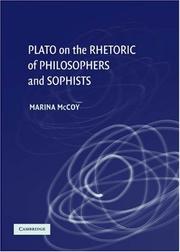| Listing 1 - 2 of 2 |
Sort by
|

ISBN: 9780521878630 0521878632 9780511497827 9780521175371 0521175372 9780511367908 0511367902 0511367317 9780511367311 0511497822 9786611146344 6611146342 1107183472 9781107183476 1139133195 9781139133197 0511366701 9780511366703 0511366078 9780511366079 128114634X Year: 2008 Publisher: Cambridge : Cambridge University Press,
Abstract | Keywords | Export | Availability | Bookmark
 Loading...
Loading...Choose an application
- Reference Manager
- EndNote
- RefWorks (Direct export to RefWorks)
Marina McCoy explores Plato's treatment of the rhetoric of philosophers and sophists through a thematic treatment of six different Platonic dialogues, including Apology, Protagoras, Gorgias, Republic, Sophist, and Phaedras. She argues that Plato presents the philosopher and the sophist as difficult to distinguish, insofar as both use rhetoric as part of their arguments. Plato does not present philosophy as rhetoric-free, but rather shows that rhetoric is an integral part of philosophy. However, the philosopher and the sophist are distinguished by the philosopher's love of the forms as the ultimate objects of desire. It is this love of the forms that informs the philosopher's rhetoric, which he uses to lead his partner to better understand his deepest desires. McCoy's work is of interest to philosophers, classicists, and communications specialists alike in its careful yet comprehensive treatment of philosophy, sophistry, and rhetoric as portrayed through the drama of the dialogues.
Rhetoric. --- Sophists (Greek philosophy) --- Rhétorique --- Sophistes grecs --- Plato. --- Gorgias, --- Rhetoric --- Philosophers --- Plato --- Rhétorique --- Language and languages --- Speaking --- Authorship --- Expression --- Literary style --- Scholars --- Philosophy, Ancient --- Gorgias. --- Aflāṭūn --- Aplaton --- Bolatu --- Platon, --- Platonas --- Platone --- Po-la-tʻu --- Pʻŭllatʻo --- Pʻŭllatʻon --- Pʻuratʻon --- Πλάτων --- אפלטון --- פלאטא --- פלאטאן --- פלאטו --- أفلاطون --- 柏拉圖 --- 플라톤 --- Gorgias Leontinus --- Gorgias von Leontinoi --- Platon --- Platoon --- Philosophers. --- Sophists (Greek philosophy). --- Criticism and interpretation. --- Платон --- プラトン --- Arts and Humanities --- History --- Platon (0427?-0348? av. J.-C.) --- Critique et interprétation
Book
ISBN: 9783515128599 9783515128643 3515128646 351512859X Year: 2021 Volume: 125 Publisher: Stuttgart : Franz Steiner Verlag,
Abstract | Keywords | Export | Availability | Bookmark
 Loading...
Loading...Choose an application
- Reference Manager
- EndNote
- RefWorks (Direct export to RefWorks)
Nach vorherrschender Meinung veranschaulicht Platon im Gorgias die Wirkungslosigkeit der Sokratischen Gesprächsmethode, da er Sokrates vor allem heftige Vorwürfe und Spott ernten lässt.Bernhard Kaiser argumentiert hingegen dafür, die emotionalen Reaktionen als Indikator zu werten, dass die Gesprächspartner wirksam in ihrem Selbstverständnis erschüttert werden. Sokratesˈ Vorgehen ist in Analogie zur medizinischen Behandlung als Seelentherapie konzipiert, wobei der Akzent der Darstellung auf dem Schmerz liegt, den die Behandlung häufig mit sich bringt. Die verbalen Angriffe gegen Sokrates lassen sich somit als Abwehrreaktionen auf die unangenehmen Begleiterscheinungen der psychischen Transformationsprozesse lesen, die durch die argumentativen Widerlegungen eingeleitet werden.Die Einbettung der Konfliktsituationen in das Handlungsgeschehen bietet zugleich die Gelegenheit, die therapeutischen Tugenden des Sokrates unter Beweis zu stellen: Platon lässt ihn im Interesse der Gesprächspartner stets besonnen reagieren und unerschrocken gegen die Widerstände ankämpfen. Die erhobenen Vorwürfe erweisen sich dabei als unzutreffend. Kaiser arbeitet insbesondere heraus, dass Sokrates auf den Gebrauch der eironeia verzichtet.
Platon (0427?-0348? av. J.-C.).
---
E-books
---
Ressentiment
---
Dialog
---
Plato
---
Socrates
---
Gorgias
---
(Produktform)Electronic book text
---
Sokratische Methode
---
Straftheorie
---
Therapeutische Tugend
---
Therapiemethode
---
Wahrhaftigkeit
---
Widerlegung
---
Wohlwollen
---
agonal
---
Behandlungsschmerz
---
Beschämung
---
Besonnenheit
---
Dialektik
---
Eironeia
---
Elenchos
---
Elenktik
---
Emotionen
---
Eristik
---
Gerechtigkeit
---
Gerichtsmetaphorik
---
Kognitive Dissonanz
---
Medizinanalogie
---
Ordnung der Seele
---
Parrhesie
---
Rhetorik
---
Richter
---
Scham
---
Schlussmythos
---
Seelenheilung
---
Sokratische Ironie
---
Agon
---
Altphilologie
---
Antilogik
---
Apologie des Sokrates
---
(VLB-WN)9567
---
Zwiegespräch
---
Dialoge
---
Dialogue
---
Wechselrede
---
Gespräch
---
Vorurteil
---
Gorgias Leontinos
---
Gorgias Leontinus
---
Leontinus, Gorgias
---
Gorgias von Leontinoi
---
Gorgia
---
Gorgia di Lentini
---
Gorgia da Lentini
---
Gorgios
---
Georgias
---
Philosoph
---
Redner
---
Rhetor
---
v480-v380
---
v05
---
-v04
---
-Aristokles
---
Eflātun
---
Eflatun
---
Platonius
---
Platão
---
Platōnas
---
Platonas
---
Pseudo-Plato
---
Platao
---
Po-la-t'u
---
Bolatu
---
P'urat'on
---
P'ullat'o
---
P'ullat'on
---
Ps.-Platon
---
Pġaton
---
Aflaṭôn
---
Aplaṭôn
---
Aflāṭūn
---
Platōn
---
Platon
---
Platone
---
Pseudo-Platon
---
プラトーン
---
Պղատոն
---
أفلاطون
---
柏拉圖
---
פלטו
---
פלאטו
---
פלאטאן
---
Athen
---
Beurer, Johannes Jakob
---
Vietor, Theodor
---
Cornarius, Janus
---
Gessner, Conrad
---
Serres, Jean <
| Listing 1 - 2 of 2 |
Sort by
|

 Search
Search Feedback
Feedback About
About Help
Help News
News